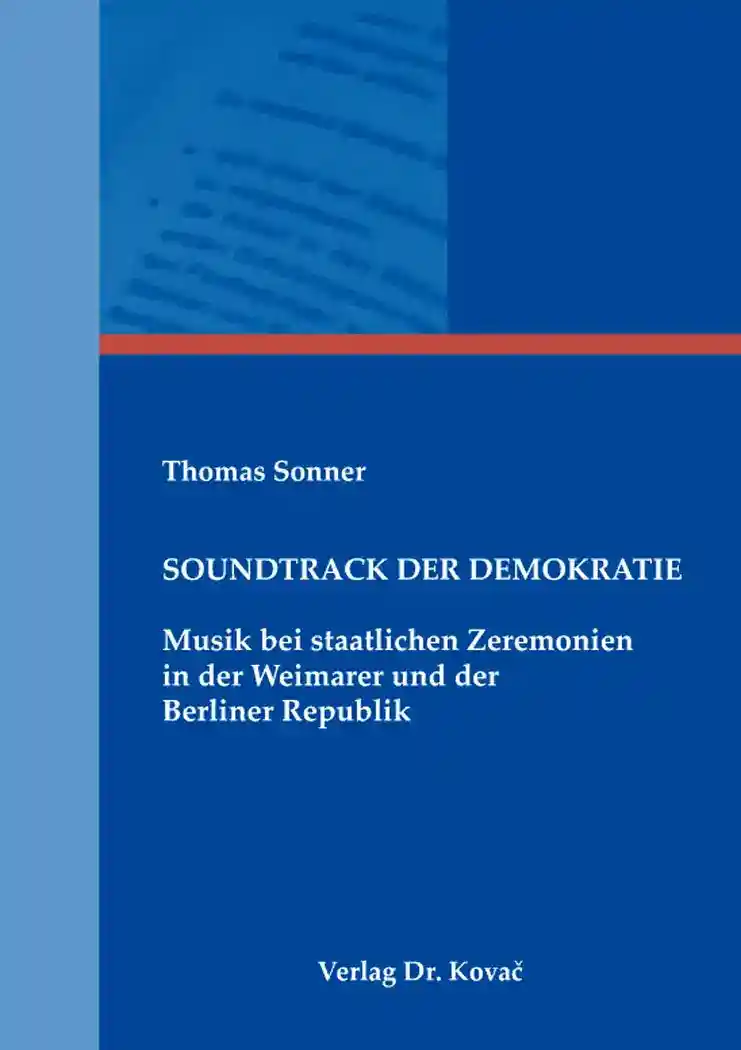Thomas SonnerSoundtrack der Demokratie – Musik bei staatlichen Zeremonien in der Weimarer und der Berliner Republik
Studien zur Musikwissenschaft, volume 53
Hamburg 2021, 536 pages
ISBN 978-3-339-12096-0 (print)
ISBN 978-3-339-12097-7 (eBook)
Rezension
[…] Überhaupt gehört die ausführliche Darstellung jener Fälle, in denen in der Öffentlichkeit über die Musikauswahl gestritten wurde, zu den lehrreichsten Passagen des Bandes, denn sie trägt viel zur kritischen Erhellung des Verhältnisses zwischen Kunst und Politik bei.[…]
Sonners diskursanalytische Betrachtungen […] sind umso wertvoller, als sie nicht nur unmissverständlich die völlige Inkompetenz zahlreicher Politiker in künstlerischen Fragen aufdecken, sondern darüber hinaus darauf aufmerksam machen, auf welche Weise Musik auch in unserer Demokratie argumentativ im Dienst politischer Manipulation und parteipolitischer Agitation missbraucht wird.
About this book deutschenglish
On the occasion of state celebrations, music creates much more than a festive setting. It imparts a communal feeling, conveys political messages and can create a sense of identity. In his doctoral thesis Soundtrack der Demokratie, musicologist Thomas Sonner examines music of ceremonies in the Weimar and Berlin republics, for the first time. The work shows how the criteria for selecting music change, which traditions persist, how sounds can trigger state-related conflicts, and why the tempo and the key of the national anthem have to be chosen carefully.
For the Berlin republic, in the period from 1990 to 2015, cermonies pertaining to the following are examined: state occasions, official mourning ceremonies, ceremonies on the Day of German Unity, and national ceremonies on the Day of Rememberance for the victims of National Socialism. The development of the Großer Zapfenstreich (Grand Tattoo) is investigated in detail from its first performance in 1838 to the present day. This military ceremony has been performed for federal presidents, chancellors, defense ministers and at anniversaries of the Bundeswehr. Thus, it will be possible to look at the music related to this military tradition from a new perspective.
Cases in which the choice of music was publicly disputed are analyzed in detail, and the following questions addressed. Are “Smoke on the Water” and “Over the Rainbow” appropriate in a Großer Zapfenstreich? Why did a so-called “Anthem Mix” on the Day of German Unity lead to political upheaval? Who chooses the music and employs the musicians? These questions are answered based on interviews with numerous decision makers, from both civil and military ceremonies. Several archive documents were made accessible, for the first time, and evaluated by the author.
The traditions related to these ceremonies can often be traced back to time period of the Weimar Republic (1919 – 1933). The Weimar Republic had to distinguish itself from the previous ceremonial traditions of the German Empire, while still envoking associations related to the ceremonial traditions of the government. Analysis of subsequent celeberations of Constitution Day, state funerals and official mourning ceremonies shows how this democracy presented itself with increasing confidence and lavishness. Nevertheless, musical styles were chosen depending on the audience, often differing for the elite and for the common people.
